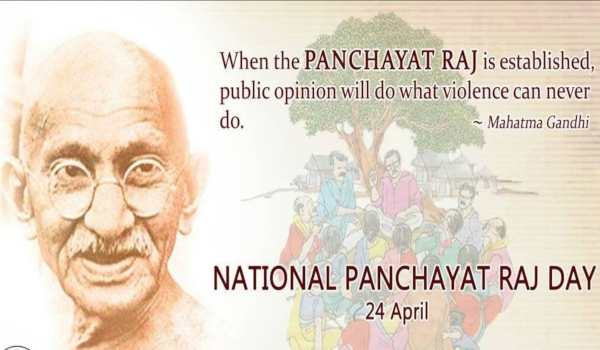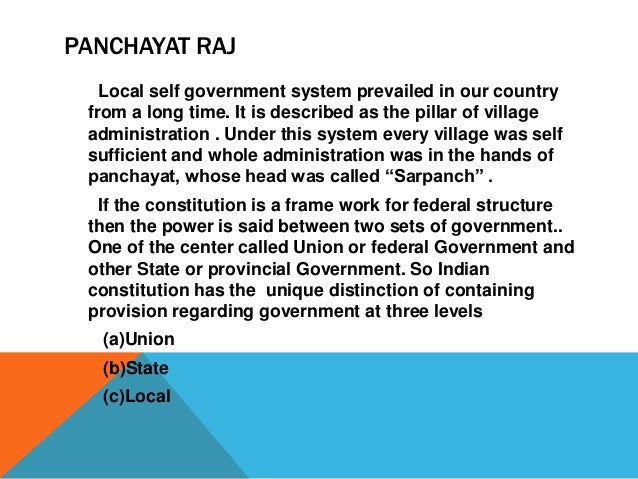Relevance: Prelims/Mains: G.S paper II: Polity: Indian Constitution- historical underpinnings, evolution, features, amendments, significant provisions and basic structure. federal structure, devolution of powers and finances up to local levels and challenges therein.• Separation of powers between various organs dispute redressal mechanisms and institutions.

Introduction
Power De-centralization is the key to every successful democracy around the globe. The 73rd and 74th Constitutional Amendment Act was passed by the Parliament in April 1993.
They were the breakthrough constitutional remodelling. Through these two amendments the power to rule is given to the citizens, the power is transferred towards the grassroots levels.
The Directive Principles for the State Policy (DPSP) says that the “State shall take steps to organise village panchayats and endow them with such powers and authority as may be necessary to enable them to function as units of self-government”.
The Balwant Rai Mehta Committee recommended towards then Union government to realize this statement in the DPSP into actions, and thus paved the path for the Panchayati raj systems in India.
The 73rd Amendment Act, 1992 of the constitution that came into force from April 24, 1993, and institutionalised the Panchayati Raj through the village level, intermediate and district-level panchayats.
To symbolize this step towards the rural development, every year India celebrates National Panchayati Raj Day on April 24.

National Panchayati Raj Day 2020
The Ministry of Panchayati Raj organizes the National Panchayati Raj day or the National Local Self Government Day.
It is to symbolise the day on the President gives his assent for the73rd Amendment bill, 1992 that came into force from April 24, 1993, which institutionalised the Panchayati Raj system through the village, intermediate and district-level panchayat celebrates the National Panchayati Raj Day.
India celebrates the first National Panchayati Raj Day or the National Local Government Day on April 2010. The then Prime Minister of India initiated for this nationwide celebration for the local self-government day. The number of villages in India is 662766, while the number of districts is 734.
Through the three tiers system of the local self-government, India aims towards effective implementation and coordination of various rural activities to benefits lakhs of its rural population.
The three tiers of the Panchayat system in India is Village Panchayat, Block panchayat or the Mandal Samithi and Zilla Parishad or the District Panchayat. The Ministry of Panchayati Raj felicitates the 170 Panchayati Raj Institutions, comprising the three-tier panchayats with the ‘Panchayat Sashaktikaran Puraskar’ for their exemplary work under the Panchayat Empowerment Accountability Incentive Scheme.
The best performers will be felicitated with the ‘Nanaji Deshmukh Rashtriya Gaurav Gram Sabha Puraskar’.
In the course of the National Panchayat Raj Day, the Union Government presents the following awards to the best performing Panchayats in the country:
- Deen Dayal Upadhyay Panchayat Sashaktikaran Puraskar (DDUPSP) in General and Thematic categories for all three levels of Panchayats. The three levels are Gram Panchayat (Village level), Mandal Parishad or Block Samiti or Panchayat Samiti (block level), and Zila Parishad (district level).
- Nanaji Deshmukh Rashtriya Gaurav Gram Sabha Puraskar (NDRGGSP) to the Gram Panchayats (Village level) for outstanding performance of Gram Sabha.
- Gram Panchayat Development Plan (GPDP) Award, to three best performing Gram Panchayats across the country.
- e-Panchayat Puraskar to states for the outstanding performances for e-enablement of panchayats.and
- Child-friendly Gram Panchayat Award.
For more such notes, Articles, News & Views Join our Telegram Channel.
Click the link below to see the details about the UPSC –Civils courses offered by Triumph IAS. https://triumphias.com/pages-all-courses.php

